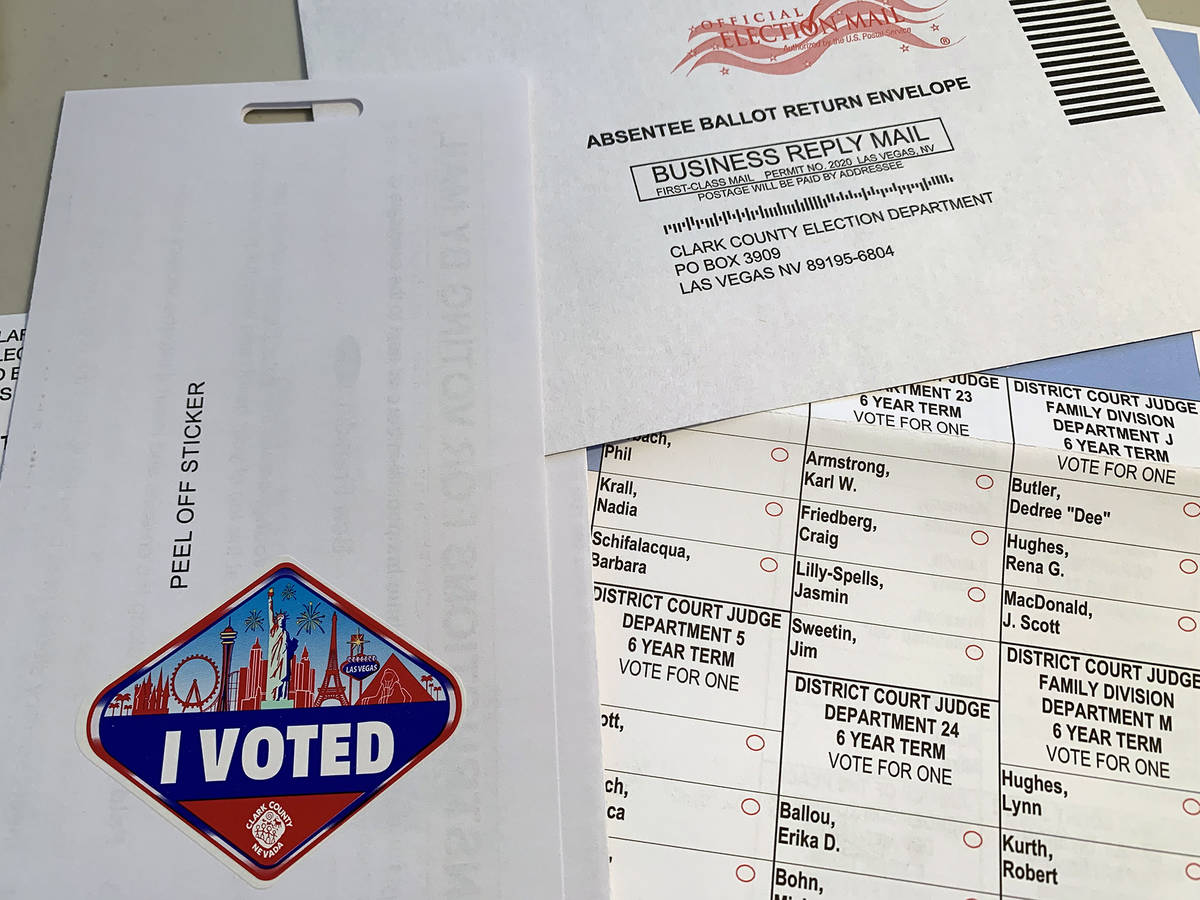Judge rejects second attempt to halt mail-in primary
A federal judge has again rejected a lawsuit filed by a conservative group that sought to stop the June 9 mail-in primary election on grounds that potential voter fraud would dilute the voting rights of legitimate voters.
U.S. District Court Chief Judge Miranda Du, in a strongly worded ruling, said the group True the Vote “glaringly repackages old arguments to achieve a different disposition without necessary justification” and concludes, “ultimately, plaintiff’s second proverbial bite at the apple is no more fruitful than the first.”
Du in April rejected an initial request to issue a preliminary injunction against the primary, saying the state’s plans to conduct the election by mail to prevent the spread of COVID-19 “far outweigh any burden” on the group’s voting rights. Further, that ruling said claims the mail-in election would facilitate voter fraud were speculative.
She said much the same about an amended complaint the group filed May 13, with additional plaintiffs and an additional claim that Clark County’s decision to send ballots to all registered voters — not just active voters — and allow deputized field registrars to help collect ballots gave the state’s most populous county an unfair advantage.
Du once again rejected the lawsuit, saying the plaintiffs lacked standing because they could not articulate an injury caused by the mail-in election that was unique to them.
“As with the original complaint, the claims in the (amended complaint) are materially grounded on ostensible election fraud that may be conceivably raised by any Nevada voter,” Du wrote (emphasis in original). “Thus, plaintiff’s claims amount to general grievances that cannot support a finding of particularized injury to plaintiffs.”
Du also said the plaintiffs had waited too long to bring the amended complaint after her original April 30 ruling, and the county’s subsequent announcement that it would send mail ballots to all voters. “Therefore, it is inexplicable that plaintiffs would delay bringing the (amended complaint) and second (preliminary injunction) motion for another nine days in light of their claimed urgency,” Du wrote. “Plaintiffs surely have not acted with the alacrity that they claim this case necessitates.”
Finally, Du cites previous Supreme Court rulings that discourage courts from altering election rules on the eve of voting. “The court is reassured that such is the right course in light of the exceptional relief that plaintiff’s request in the (amended complaint), which would completely upend the June primary,” she wrote.
Du also says the claims of voter disenfranchisement in the lawsuit are “speculative at best.” She added that a concern that the rules of the election may result in more Democratic votes being cast in Clark County is irrelevant in the primary, because Nevada is a closed primary state, and only Democrats can vote in their party’s races. Only in a general election could such a partisan advantage potentially have an effect on the outcome of the race, she noted.
Attorneys representing plaintiffs including True the Vote did not return emails seeking comment on Thursday.
Still, on Thursday, White House press secretary Kayleigh McEnany raised the issue of loose ballots and potential voter fraud in a briefing with reporters.
“There were ballots — because Nevada mass mailed them out to voter rolls — that were piling up in apartment complexes, outside of apartment complexes in Las Vegas, sitting around in trash cans,” McEnany said. “This is how we’re protecting ballots? It’s extraordinary.”
Even if a ballot were to fall into the hands of a would-be fraudster, however, there are protections in place to prevent that ballot from being counted. The required signature on the outside of the ballot would have to be matched against the county’s database of voter signatures; if they don’t match, the ballot would be set aside while the county tries to the reach the voter in question to confirm he or she voted. If that attempt fails, the ballot would not be counted.
Contact Steve Sebelius at SSebelius@reviewjournal.com or 702-383-0253. Follow @SteveSebelius on Twitter.
Paher v Cegavske AC-Order by Steve Sebelius on Scribd























